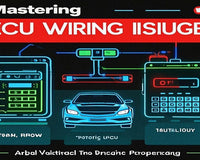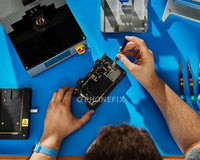Your car’s Anti-Lock Braking System (ABS) is a lifesaverliterally. It prevents wheel lockup during hard braking, keeping you in control on wet, icy, or uneven roads. But like any mechanical or electronic component, the ABS system can fail, and its heart of the ABS module often takes the blame. 
What Does the ABS Module Do?
The ABS module is the electronic brain that monitors wheel speed and modulates brake pressure to prevent wheel lock-up. If the module malfunctions or if the sensors IC feeding it data are faulty, your ABS won’t work as intended, and in some cases, your regular brakes might even be affected.
5 Clear Signs of a Bad ABS Module.
1. The ABS Warning Light Stays On.
The most obvious clue is the ABS light on your dashboard. It should illuminate briefly when you start the car and turn off within a few seconds. If it stays on, flashes, or comes on while driving, it’s a direct signal that the module is faulty. XTOOL D9SPRO diagnostic tool can quickly scan and diagnose the fault location.
2. Unusual Noises or Vibrations When Braking.
Healthy ABS might make a faint, rhythmic sound during hard braking. But a bad module can cause excessive vibrations, grinding, or a spongy feel when you press the brake pedal. These noises often mean the module is failing to regulate pressure correctly, leading to uneven brake force on the wheels.
3. ABS Fails to Activate When It Should.
ABS is meant to prevent lock-up. If one or more wheels lock during moderate stops, the module may be failing to interpret wheel-speed data or actuate valves correctly, that often a control-board fault, not just sensors.
4. Brake Pedal Behaves Erratically.
Random pulsation at low speeds, unusually firm pedal feel, or inconsistent braking response can reflect incorrect valve modulation commands inside the module.
5. Traction/ESP/Brake Lights Together.
Modern cars tie ABS to traction control (TCS) and stability control (ESC) systems. A bad ABS module often triggers their warning lights too. This happens because all three systems rely on the same wheel speed data, if the module fails, the others can’t function properly either.
While faulty modules are often the suspect, faulty sensors shouldn't be overlooked. They convert raw speed data into electrical signals that the ABS module can interpret. If any integrated circuit (IC) fails, the sensor will send garbled data or no data to the module, potentially causing the entire system to fail.
A non-functional ABS system increases your risk of accidents, especially in bad weather. Even if your regular brakes work, ABS is a critical safety feature. Get a diagnostic scan, XTOOL D6S professional scan tool can deeply diagnose vehicle systems, read fault codes, and identify the root cause, whether it's a module or sensor.
If the IC or sensor needs replacing, please choose OEM parts. Cheap aftermarket parts might fail quickly and cause more issues. Visit the China ECUFIXTOOl store, which supplies all chip models on the market and can significantly save your time and energy.
Your ABS module is vital, recognizing the signs of a bad ABS module early and getting a proper diagnosis, you can save money, avoid safety risks, and keep your car’s braking system in top shape.
How to Spot a Bad ABS Module?










